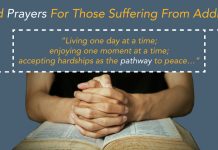Praying before and during a test can help overcome test anxiety. Test anxiety affects everyone depending on how much pressure is felt to make a good grade. Test anxiety can range from mild to severe. When test anxiety is severe, studies show that students receive scores lower than those of other students who do not feel nervous, physically ill or distracted during a test. Test anxiety can occur in school, in college or in the work place.
Here is a prayer for you that can be prayed before the test and also has short, one-sentence prayers that can be prayed during the test to help you feel calmer and more focused.
Table of contents
Test Anxiety Prayer Using Scriptures
Repeat the following Scripture to begin the prayer:
Search me, God, and know my heart; test me and know my anxious thoughts. Psalm 139:23 NIV
Lord, I thank you that you know my heart and my thoughts. I thank you that you are the Good Teacher and that You do not need to test me in high pressure situations where I’m nervous about whether I’ll be able to perform well. Instead you know my true talents, my character and my capabilities. You know the hours of study I have put in and you know how well I understand the material for the upcoming test. It comforts me that you know my anxious thoughts and take them into account. I open myself up to you and your complete knowledge of everything I think and worry about.
I pray that during the test if I begin to feel anxious that you will remind me to pray, “Lord, you know my thoughts and my true capabilities.”
As I pray this with confidence, I will do it based on the truth you tell me in the Bible about how well you know my thoughts:
“You know when I sit and when I rise; you perceive my thoughts from afar.” Psalm 139:2
I pray that if during the test of my mind seems to go blank that you will remind me to pray: “Lord, remind me of everything I need to remember.”
As I pray this with confidence, I will do it based on the truth you tell me in the Bible about your ability to remind me of all things:
“But the Advocate, the Holy Spirit, whom the Father will send in my name, will teach you all things and will remind you of everything I have said to you.” John 14:26 NIV
I pray that if during the test I begin experiencing physical symptoms of nerves like a headache or feeling sweaty and anxious that you will remind me to pray: “Lord, heal all of my diseases.”
As I pray this with confidence, I will do it based on the truth you tell me in the Bible about your ability to heal my body.
“God forgives all your sins and heals all your diseases.” Psalm 103:3 NIV
I pray that if during the test I become so wrapped up in distractions either inside my head or outside as I watch the clock or compare myself to other students who seem to be breezing through the test that you will remind me to pray, “Lord, keep my mind on track.”
As I pray this with confidence, I will do it based on the truth you tell me in the Bible about your ability to help us keep our minds focused.
“You will keep in perfect peace those whose minds are steadfast, because they trust in you.” Isaiah 26:3
I pray that if I get a test result back where test anxiety caused me to make a grade that doesn’t reflect my mastery and knowledge of the subject, I pray that you will give me the courage and wisdom as to whether to speak with my teacher, professor or supervisor about the problems I experienced. Please guide me whether to ask for advice on earning extra credit or getting help on study habits or test taking skills and strategies. I will pray, “Lord, show me how to recover and be restored.”
As I pray this with confidence, I do it based on the truth that you are a God of second chances, based on what the Bible says about your ability to redeem and restore.
“And the God of all grace, who called you to his eternal glory in Christ, after you have suffered a little while, will himself restore you and make you strong, firm and steadfast.” I Peter 5:10
Most of all, I thank you that no matter what my hopes, dreams, challenges and fears are, the closer I become to you and the more I learn to depend on you, the more confident I will become that you are there with me in all stressful situations of my life.
Amen.
Research on Test Anxiety behind this Prayer
This prayer covers what researchers term the 3 dimensions of test anxiety:
Worrying about failing the test
The actual physical sensations you might feel during the test that are symptoms of your anxiety (examples heart beating faster, palms sweating)
Distractions during the test that are often nervous habits that cause you to lose focus
Useful treatments include therapy that helps you overcome negative thought patterns that are interfering with your ability to perform well on tests. Also, there are classes and groups to help you become more confident in your study skills and testing skills.
Experts are currently looking into the problem of test anxiety and its causes. For instance, studies on the topic of math anxiety show nearly half of all Americans suffer from a feeling that they are not “good” at math. According to Jo Boaler, professor of mathematics education at Stanford University, this probably originates from the timed test drills in elementary school where you must quickly write down the answers to addition or multiplication problems. Educators are now discovering that this causes students to simply memorize facts without really understanding the concept of the mathematical principles. Understanding and appreciating these principles is crucial later on in higher math which is conceptual in nature. Making matters worse, brain researchers have also found that under pressure, memorized facts become blocked by the testing worries, causing the students to lose confidence in their abilities.
Other Helpful Links
Final exam prayer with scriptures
College stress prayer strategy
Finding your personal meditation and prayer place at college
Overcoming procrastination prayer
Anxiety calming prayer
Fear of public speaking prayer
Copyright Karen Barber 2014. All rights reserved.
prayerideas.org
When sickness strikes, people around the world pray for healing. Many of the faithful claim that prayer has cured them of blindness, deafness and metastasized cancers, and some believe they have been resurrected from the dead.
Can, and should, science test such claims? A number of scientists say no, concerned that empirical studies of prayer will be misused to advance religious agendas. And some religious practitioners agree with this restraint, worrying that scientific testing could undermine faith.
If prayer affects health — for better or for worse — then patients, doctors and policymakers should all want to know. Scientific research has returned mixed results. Some studies conclude that prayer improves health, while others show no effect — or suggest that prayer may lead to worsening health.
Part of the confusion stems from how prayer is studied. Most research is on distant intercessory prayer. Intercessors are given the first name and condition of someone they do not know and told to pray. Researchers set up double-blinded trials — because this is how they are accustomed to studying health interventions — and base conclusions on the efficacy of prayer solely on whether subjects in the experimental group exhibit better health than those in the control group.
But when people actually pray for healing, they usually get up close to someone they know, touch the person and empathize with their sufferings — what I call proximal intercessory prayer, or PIP. Double-blinded, controlled trials are not the only — or even the best — way to gauge the effects of this kind of prayer practice.
I have spent the past eight years studying PIP by Pentecostal and Charismatic Christians — the groups most likely to pray for healing and claim that their prayers work — in the United States, Canada, Brazil and Mozambique. And I used multiple methods, each one suited to answering a particular question about prayer for healing. Each method is like a different type of camera, offering complementary perspectives on how prayer affects health.
Camera 1: Medical Records: Are healing claims documented?
Comparison of medical records from before and after prayer provides a check on whether people claiming healing exhibited improvements for which there is no obvious explanation. For example, in the course of my research, I met Daisy, who had worn hearing aids for 30 years. She had a progressively worsening, hereditary inner-ear problem. In 1999, tests showed moderate hearing loss; by 2004, Daisy’s hearing loss was moderately severe to severe. In 2008, Daisy received PIP and “felt my fingers on fire and the warmth of the Holy Spirit inside of me,” after which she could hear without hearing aids. She had her hearing retested two weeks later, showing normal thresholds in lower frequencies with moderate loss in higher frequencies. A 2010 screening still showed normal hearing in speech frequencies. Medical records do not prove that “God” healed Daisy through prayer, but do confirm Daisy’s claim of improved hearing.
I also came across Frank, who claimed improved vision after prayer. He produced an optometrist’s note stating that “On 02” his left eye uncorrected visual acuity was “20/200”; in 2007, it was “NOW 20/40.” I followed up with Frank’s optometrist, who revealed that the record had been “altered.” The phrases “On 02” and “Now 20/40” had been added. The unaltered record shows visual acuity of 20/200 in 2007 — after Frank’s supposed healing. Such cases of apparent fraud do not seem to be common, but medical records are one way of sifting out which claims are less credible.
Camera 2: Surveys: How do sufferers perceive healing prayer?
Surveys shed light on how supplicants perceive sickness, prayer and healing. In one set of surveys I carried out, 72 percent of respondents had a current need for healing; the most common complaint was pain. Fifty-two percent reported healing. Few “claimed healing by faith,” instead defining healing as noticeable improvement of symptoms. Those who self-reported high faith were no more likely to experience healing than those who admitted weak faith. Most received multiple prayers for the same problem, noting progressive improvements with each prayer. Most also went to doctors, viewing prayer and medicine as complementary.
Camera 3: Clinical Trials: Can health outcomes of prayer be measured?
Clinical trials can show whether PIP results in measurable changes in health markers. In a prospective study of hearing and vision in Mozambique, I found highly significant improvements in hearing and statistically significant improvements in vision following PIP. Two of 11 hearing subjects had thresholds reduced by over 50 dBHL. One subject, Jordan, was presented as deaf and mute since birth and made no responses to sounds at 100 dBHL; after PIP, he responded to 60 dBHL tones, imitating sounds in a hoarse, raspy voice. Three of 11 vision subjects improved from 20/400 or worse to 20/80 or better. Before prayer, Maryam could not count fingers from one foot away; after one minute of PIP, she was reading the 20/125 line on a vision chart.
Camera 4: Follow-up: Do healing experiences produce lasting effects?
Multi-year observations and interviews assess whether changes are temporary or enduring. Many informants — such as George, who reported healing from an untreatable brain tumor through prayer alone — claimed they were still healed as many as eight years later. George and others had subsequently prayed for others who in turn reported healing, and this new cohort prayed for still others, sometimes traveling to other countries to do so. Such ripple effects of healing prayer largely account for the wildfire spread of global pentecostalism.
Bringing these four cameras into focus produces a more complete picture of how prayer affects health than using any single study method. Can science prove the healing power of prayer? Science cannot prove the existence or nonexistence of a suprahuman force or whether such an entity answers prayer. But it is an empirical question how prayer practices affect health. And we can — and should — use empirical methods to answer this question.
Candy Gunther Brown, author of Testing Prayer: Science and Healing (Harvard University Press, 2012).
www.huffingtonpost.com










